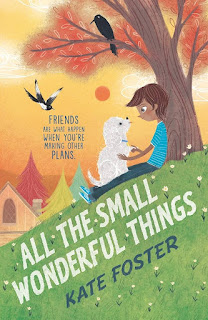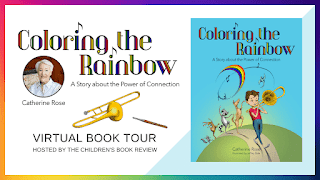All the Small Wonderful Things by Kate Foster
About the Book:
In an endearing story about an autistic boy and his
steadfast furry pal, Alex is convinced that winning a trophy at the dog show
will help him make a real friend at last.
Eleven-year-old Alex knows that starting middle school will
be a big change, and for an autistic person, change can be terrifying. He is
sure that having a friend by his side will help. But how can he make one? Alex
devises a plan to impress the kids at school by winning a trophy at the PAWS
Dog Show with his trusty sidekick, Kevin the Cockapoo. This should be a walk in
the park, right? If only. It turns out that finding a friend is harder than
Alex thought—unless, maybe, friendship is about something more than popularity.
This charming story, told through Alex’s clear and honest
voice, navigates relationships of all stripes between classmates, new
neighbors, family, and, of course, a kid and his dog. After all, friendship
isn’t one-size-fits-all—maybe it’s found in the small things where you least
expect it.
Guest post by Kate
Foster: What started your love for books and your current projects?
I honestly don’t know what started my love for books, mainly
because I was a booklover way back when I was a teeny tiny person (and that was
so very many years ago!). Throughout my whole childhood, I don’t think a day
went by without my father reading a newspaper or wildlife magazine cover to
cover, and my mother was, and still is, a big reader of novels. I vividly
remember bent and buckled paperbacks stacked haphazardly on the floor and
shelves all around our small house. She would also take me to the local library
often, not only to borrow books, but also simply to spend time there.
So, I guess reading
was part of my natural environment from the moment I was born.
The children’s section of our library was quite a magical
place, as I remember it, with beanbags and colourful chairs and building blocks
and soft toys. But the best part – and perhaps most significant part too – was
that I was allowed to take from the shelves whatever I wanted. I’m sure my
mother would have suggested books for me as well, and I know she sat with me
and we’d look through the books together, but for the most part, I was in
control of my reading journey, regardless of whether the books were considered
“too young for me” or if I’d read them before.
Maybe, I’m evidence
of how letting kids read for pleasure creates lifelong readers.
Growing up books were always important to me, even though
there were stages when I was preoccupied with other demands and I didn’t devour
one after the other. But I returned to them, always. They were a way to escape,
to feed my wild imagination, and, what I’ve come to realise now, a place to
find acceptance – not for who I tried to be, but for the real me who always
felt a little lost and overwhelmed by life.
Books really do make
great friends!
The stories and the characters didn’t have confusing
expectations of me, nor did they require me to adjust my personality to fit in
with them. I was able to be a part of the adventure and the journey however I
wanted and felt comfortable to.
And this leads perfectly into why I now write the books I
do. I put autistic kids in books that are not about autism or the child’s
struggles or how they must change to be accepted by their peers. That’s because
my characters are fine just as they are, their family and friends already adore
them just as they are, and everyone else must adjust their way of thinking to
fit in with them just as they are.
This is the reality
we should be striving for, moving beyond autism awareness and onto autism
acceptance.
Of course I don’t shy away from showing how day-to-day life
as an autistic person can be exhausting, nor from challenging my characters to
dig deep and understand themselves better, as all characters must, but that
won’t involve changing their autistic selves to make others accept them.
Animals (mostly dogs!) also play a huge role in many of my
books. We see most animal species as primitive, yet I reject this notion. Wild
animals have mostly figured humans out and the dangers we pose them, but dogs
have taken it a step further. As a result, by manipulating us with their
evolved cuteness and loyalty, they offer uncomplicated and unmatchable
friendship. I believe many autistic people are far more tuned into this and as
a result prefer the company of animals.
About the Author:
Kate Foster is a children’s author writing about friends,
family, and dogs. Originally from a small town in the southeast of England, she
now lives on the stunning Gold Coast in Australia with her family and
second-hand dogs. She is passionate about encouraging and teaching a wider
understanding of autism and mental illness via a positive approach and
representation in both her books as well as her presentations and talks.
For more information, visit www.kfosterbooks.com.
Giveaway:



Thank you for being part of my blog tour! Kate F. xx
ReplyDelete